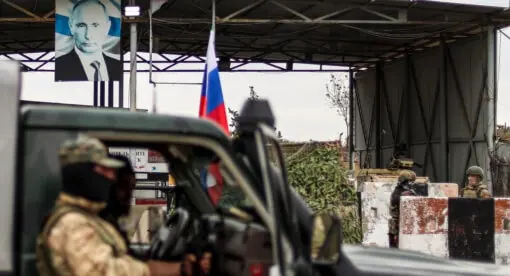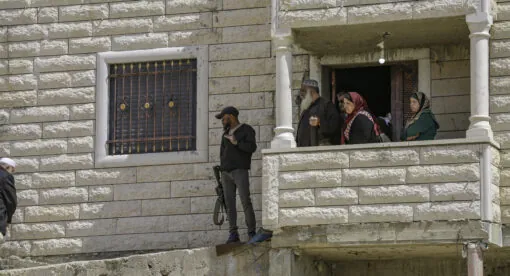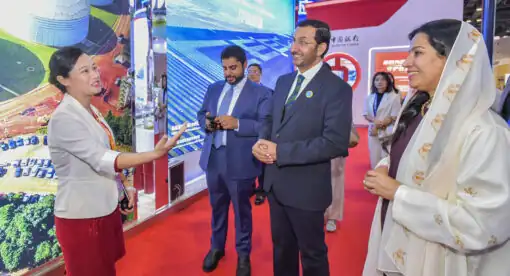In this episode of Contours, we turn to the Balkans. On the heels of our recently published policy report, host Carolyn Moorman talks with report editor Tanya Domi and author Ivana Stradner about Russian information warfare in the region, as well as what the U.S. can do about Russian influence in the region and the Putin regime’s information warfare campaign.
Carolyn Moorman:
Hello and welcome to the New Lines Institute for Strategy and Policies Contours podcast. This is your host, Carolyn Moorman. And today we’ll be discussing how Russia has influence in the Balkans with the continued rollout of New Lines’ Western Balkans Observatory that it launched this fall with a report titled Western Balkans 2023 Assessment of Internal Challenges and External Threats.
Here to dive into this with me today is the author of one of the essays of the report that discussed this topic, Ivana Stradner, and the report’s editor, Tanya Domi. Before we begin, a little bit about our guests. Dr. Ivana Stradner serves as a research fellow with the Foundation for Defense of Democracy’s Barish Center for Media integrity. She studies Russia’s security strategies and military doctrines to understand how Russia uses information operations for strategic communication. Her work examines both the psychological and technical aspects of Russian information security.
Ivana also analyzes Russian influence in international organizations. She’s currently focusing on the U.N. Cybercrime Treaty and U.N. efforts to regulate information security. Ivana also serves as a special correspondent for Kyiv Post. Before joining FDD, Ivana worked as a visiting scholar at Harvard University and a lecturer for a variety of universities, including the University of California-Berkeley School of Law, and as a Jean Kirkpatrick fellow at the American Enterprise Institute.
Also joining us is Tanya Domi. Tanya is the editor of the report. She’s also an adjunct assistant professor of International and Public Affairs at Columbia University’s School of International and Public Affairs, and an affiliate faculty member of the Harriman Institute, which she has taught in the Balkan studies program since 2008. Prior to her faculty appointment at Columbia, Tanya served in the U.S. Army 15 years and later worked as a congressional aide and military policy advisor to the late congressman Frank McCloskey.
She also worked internationally for more than a decade on issues related to democratic transitional development, including media development, human rights and human trafficking. She’s expanded her research to include genocide, conflict-related sexual violence, and the prevention of atrocity crimes. Thank you so much both of you for being here. Tanya, I’d like to start with you and talk about how Russia operates in the Balkans. We know that Russia commonly uses a strategy placing itself as the kind of juxtaposition to the west and saying, “Hey, you can work with us. We’re not the West.” We’ve seen this used throughout Africa. So I’m wondering how does Russia apply this strategy culturally and politically in the Balkans?
Tanya Domi:
Well, I think culturally it has closely aligned with Serbia and Slavic “brothers” and I put that in quotes, for generations. This even goes back to the Congress of Vienna in the 19th century when Russia supported Serbia at that time. And if you walk down the street in Belgrade, you will see that you could buy a T-shirt of Vladimir Putin. Serbia, right now, without a doubt outside of Belorussia, is the most pro-Russian country in Europe. And so, the culture is one seen through a Slavic prism and has been embraced and it’s been instrumentalized. And Russia uses that as a way to advance its cultural values and to create friendships and allies. And what’s also a phenomenon now in the 21st century, more than ever, now what you have is a multipolar world in which Russia has really advanced itself in the Balkans as a major player.
Carolyn Moorman:
Absolutely. And Tanya, while you were on the topic of Serbia and how Serbia plays into Russia’s larger geostrategic goals in the Balkans, I’m wondering how much autonomy would you say the Serbian government and Serbian President Vučić , has and how it acts? Do you see it as a direct command control relationship where Russia says jump and Serbia says how high?
Tanya Domi:
What we are seeing is a number of proxies. In Zagreb there are proxies, and one of those actors is Dragan Čović, who is a Bosnian Croat, but uses Zagreb to leverage his influence in the EU. And also Milorad Dodik the president of the RS entity in Bosnia, is probably one of the most significant proxies in the Balkans. He probably goes to Moscow even more than Aleksandar Vučić, who’s president of Serbia. But Serbia wants to jump and wants to have this relationship. For example, Serbia does participate in NATO exercises, but they cooperate. They will not join NATO and they will not integrate. Those are the words that are used when they’re speaking publicly.
So Vladimir Putin flies in to celebrate the ending of World War II, and there’s flyovers with MiGs in Belgrade. This makes Vučić show that he’s got support from Moscow and also this gives him support in the broader population. Of course, not everybody in Serbia agrees, but they’re the minority. One of the other aspects of the Ukraine-Russian War right now is that many Russians have moved to Serbia, and in fact, many of them oppose Putin himself. So that’s a really interesting dynamic socially all in my comments there.
Carolyn Moorman:
Absolutely. And Tanya, you’ve done a really great job in outlining for us these political elements of Russia’s involvement in the Western Balkans. And now Ivana, you have done a lot of work on information security and how Moscow weaponizes this in the Balkans. And so I’m wondering if you can lay out what this strategy is in the Balkans.
Ivana Stradner:
So first of all, my key research is truly on how Russian military and intelligence has been using information as a weapon. And the Balkans is really only one part of my research, but it’s a very important part because it’s a very important ground where Russia has been testing its tools for many years. The way that Russia perceives information security is very different from the way that here we in the West understand information security. Russia combines both the technical part, for example, what we call here cybersecurity, which is for instance, attacks and critical infrastructure versus psychological operations. So they combine the two. We do not. And that’s one of the key differences.
That’s exactly how Russia has been operating in the West for many years, and the Balkans is also part of that game. So what Tanya just emphasized that Russia is indeed opening a new front. Many analysts in the west think that Russia cannot help Serbia or Republika Srpska, for example, with tanks and jets. Russia doesn’t need to do that. All Russia has to do is to continue what has been doing over the past more than a decade of intense work in terms of polarizing the Balkans and setting informational conditions towards conflict.
And Russia has been operating through very deceptive measures like for example, through social media platforms or Russia also has very strong and powerful tools in terms of media in the Balkans. Russia has numerous proxies that Tanya just emphasized. But in my field of information warfare, in addition, certainly to Vučić , Dodik or other leaders, Russia also operates through social media influencers or sportsmen or through culture or through religion. For example, the role of the Serbian Orthodox Church plays a tremendously important role.
Russia operates also Russian media platforms in the Western Balkans through RT and Sputnik. And while some analysts in the West may laugh about the impact that these two platforms have, because for example, they may sometimes just gather like two or three likes on social media platforms, whether Facebook or Twitter, that doesn’t matter because the way that it operates is the following. They would, for example, write a certain article that would just get picked up by local media or local bloggers and then spread all over the information space.
The messaging is also very interesting. So during the Cold War here in the West, Russia didn’t have actually much to offer other than Bolshoi Ballet or for example, Russian literature. We were also here in the West using, for example, information operations also inside Russia, through jazz music, through for example, modern art, et cetera, et cetera. This time around Russia and the Balkans can actually offer something very different, something that the West cannot, which is ties to culture, ties to the Islamic Brotherhood and ties to religion.
And Russia also has played a very important role also in terms of sports. And all those things might sound ridiculous to many, but such what I would like to call a soft power tools play a very important role by targeting specifically the far-right groups. Russia has also been investing tremendous resources in developing relations with the youth. This is a long game for them. They have been investing in rap music. They have, for example, been investing in numerous events that target specifically the youth in the region in terms of sharing the culture, talking about politics, talking about multipolar world. All those things that can actually, on a long run, play a very important role.
Finally, I always like to say that even though President Vučić likes to, in the West, portray himself as the victim of Russian interference, he’s not. He benefits tremendously from Moscow’s influence operations because that also allows them to use that as a bargaining chip against the West. Now, an interesting thing is that how he operates the information space in Serbia, for example. You have local propaganda that often picks up stories coming from Russian media, or for example, they openly claim that it was Ukraine that attacks Russia first.
They have been spreading disinformation campaigns about bio weapons. But also for example, the role of the church plays an important role because the media has been portraying the war in Ukraine as something that they want to deliberately destroy Orthodox Christianity. And President Vučić also has been the part of that game who has a full information superiority and monopoly of that space in the region. So it is really difficult as of today to counter those operations. So we can certainly talk later about what actually we can do about that because we are late. The West has been investing resources in countering Russian propaganda.
But just exposing them, this is really, really not enough. We have to actually use a very different tools if we want to counter Russian propaganda. And just my final thought is why does this even matter? As I said at the beginning, tanks and jets are not important because, do not forget that Putin is not a military guy. He’s a KGB guy. He operates through different tools. Serbia also even during the ’90s, was operating through paramilitary groups, but also with a very important Department of Psychological Operations within Serbia’s Ministry of Defense. And having said that, just having a conflict below the threshold of war is exactly what Putin and his allies in the Balkans want to do. Strategic goal is to show actually that the West is nothing more than a paper tiger.
Carolyn Moorman:
So you’ve touched on a lot of the tactics that Russia is using in the Balkans, and I particularly liked your point at the end about how Russia likes to keep things simmering and doesn’t want an outright conflict, but is able to achieve the closest alignment to its geostrategic goals in a lot of these countries with these simmering ethnic tensions and all of these things going on through information warfare and things are kept the way they are. And so before we move on to the two conflict zones, as we’ve established in previous Contours episodes with Tanya of Kosovo and Bosnia-Herzegovina, Ivana, I want to ask you about two of the other countries that you mentioned in your essay for New Lines, which is how Russia has done things and achieved goals using these tactics in North Macedonia and Montenegro.
And so I’m wondering if you can speak a little bit about what Russia did to achieve goals in these countries and if we can draw any lessons from how they did what they did and apply it to how Russia is engaging in the Western Balkans now.
Ivana Stradner:
Absolutely. So when North Macedonia decided to join NATO, that was something that the Kremlin certainly didn’t like. And Moscow openly sent a threat that in case of the country joining NATO in case of a conflict between NATO and North Macedonia that, that could also become a target. And unlike, for example, the countries in its neighborhood such as, for example, Ukraine or other countries, including whether Georgia, their membership to NATO is a direct threat to the Kremlin as they like to paint that argument why Ukraine, for example, should not join NATO.
When it comes to the Balkans, Russia has very different goals. Russia does not need to occupy the region, and Russia couldn’t care less about North Macedonia or Montenegro. The only reason why Russia cared back then is actually to show that North Macedonia or Montenegro should not join NATO, that NATO is an evil institution to show it publicly and to show actually that NATO does not even have capacity to grow after the end of the Cold War.
That was the key messaging that Russia was hoping to achieve. And also let’s not forget about specific strategic interests, especially in Montenegro when it comes to having access to the Adriatic Sea. So that was the part where Russia strategically cared about North Macedonia or Montenegro. So North Macedonia, for example, Moscow spread disinformation campaign prior to the name change referendum. They finally basically allowed North Macedonia to join NATO. For years Russia was also gaslighting Bulgaria that they should take their part of the country and to sow more discord and chaos.
And we know that Bulgaria was already in NATO and in the EU. Same thing happened with Greece. So in addition to that, let’s also not forget that Russia also established numerous troll factories in North Macedonia to peddle these information campaigns right before 2016 elections. And the reason for that is because people there were not ideologically driven in terms of who would win these elections. It was mostly money-driven. But people in the region, they speak English, they can conduct the business on behalf of Russia.
But to me, an even more interesting example when it comes to the role that Russia has played in the Balkans is actually Montenegro because it was Moscow that actually supported the coup in 2016 on the day of the Montenegran parliamentary election. That was the moment where Russia was hoping to prevent Montenegro’s accession to NATO. And as I said, why Russia actually even cared about bringing Montenegro to NATO would jeopardize its stance in Montenegro. But also Montenegro is tremendously important because of the role of the Orthodox Church.
So for example, I’ve been following Russian role in Ukraine when it comes to the Orthodox Church for a very long time. Russia used exactly the same strategy in Montenegro that it had been used in Ukraine. So basically you had a polarization within the church because the Russian Orthodox Church subordinate branch actually in Ukraine supported Russia’s annexation of Crimea and the invasion of Eastern Ukraine in 2014. And the Kremlin has been likely even leveraging the Ukrainian Orthodox Church, Moscow patriarchy to further develop Moscow’s irregular proxy networks in Ukraine.
It sought actually to create different parallel security structures in Ukraine, et cetera, et cetera. It’s needless to say what’s happening right now over there and how Russia has been even using that with allegedly here in the West peddling this information that Zelensky is destroying the Orthodox Church, which perfectly resonates with a lot of conservative people in the West who claim actually that Zelensky is now destroying Christianity. So very similar, actually, tactic also happened in Montenegro. Because Russia, through the Russian Orthodox Church, has been trying to manipulate the part of the Serbian Orthodox Church through sowing ethnic discord among Montenegro’s ethnic Serb population, and to promote pro-Russian policies following Putin’s playbook.
The Serbian Orthodox Church also leverages its influence in Montenegro through the active participation in political processes. So for example, it absolutely influenced the election of Montenegro’s [inaudible 00:17:49] pro-Russian Prime Minister Zdravko Krivokapić and organized massive protests in all major Montenegran cities in early 2020 called. The whole idea actually was to create something that is called the Serbian world, which is a Balkan parallel to the Russian world where all Serbs would live and be united under a common cultural framework.
Even today I’m absolutely speechless, like did this even new government, even though they would love to see Montenegro as part of European Union, they still very much have close ties to the church. And both Serbia and Russia understand that religion plays a tremendously important role in the region. Because national identities and religion are something that can actually be used to further polarize countries. So that’s truly the part of Russian and Serbian hybrid warfare efforts in Montenegro.
Tanya Domi:
If I could add to what Ivana just said, the instrumentalization of the Serbian Orthodox Church with the Russian Orthodox Church is not only used, but it’s also a threat to human rights, I might add. The church is very, very much against the rights of LGBTQ community. And here’s the irony, that last year Belgrade was hosting European pride and then Alexander Vučić attempted to cancel Belgrade Pride. Well, so what?
Well, it’s hard to say why you would say on one hand you want to join the EU and on the other hand you would want to cancel Pride. But really in the crosshairs here is Russia, the churches, and also the idea that there are people in Serbia that would claim like those in Russia that, “We’re defending family values.” And so that’s another example of how they would advance discord. And unfortunately, Putin didn’t probably get his wish and Pride wasn’t canceled.
But the church is a major cultural actor in the Balkans. And let me just also add to what Ivana has already explained. In the case of Bosnia and the dissettlement or the pernicious role of Russia is self-evident in the Peace Implementation Council, which Russia sits on in Bosnia, which oversees the Dayton Peace Accords. In this case, Russia has refused to sign any communique in 11 years that has been issued by the Peace Implementation Council. And so last year in ’22, the Russian ambassador to Bosnia issued a statement saying, “Well, Bosnia, you might want to join NATO and that’s your prerogative. But we have a response to that. Just look at the war in Ukraine.” It was that brazen and I” end my comment there.
Carolyn Moorman:
And using everything that Tanya and Ivana just mentioned of the role of the Russian Orthodox Church, information security, playing into elections, doing all of these maneuvers, I’m wondering how Russia is taking advantage of the discord in the Balkans that we’ve discussed on previous episodes and really funneling all of this energy into pulling the West and the EU away from Bosnia-Herzegovina and Kosovo and showing their primacy.
Ivana Stradner:
So just briefly on that, because Russia understands, along with its Serbian ally, the vulnerabilities in the region. And there are two specific vulnerabilities for Russia to achieve its foreign policy objectives. Again, it’s not to gain more territory in the region, but rather to disrupt the Balkans to such extent and put it in the brink of war so the West pays more attention, energy, attention and resources to the region instead of helping Ukraine.
And both Bosnia and Kosovo are very important in that sense. So Russia understands very well that Kosovo plays a tremendously important role, what I like to call it in the hearts of many Serbs thinking that Kosovo is still part of Serbia. And President Vučić, as soon as he came to power, he understood that to remain in power, he has to completely destroy raw democratic pro-Western opposition and to strengthen the far-right groups.
And the best way to do that was actually to fuel such narratives to the far-right groups. That’s exactly what Milosevic had been doing back in the ’90s. What we actually saw in Banjska in September or later and earlier during the summer when more than 30 NATO peacekeepers were injured in Kosovo is exactly what Putin had been hoping for. Putin’s objective over there is to show that NATO is a paper tiger. I doubt that as of today Putin can or will attack Poland, but Putin has been searching for NATO’s weak links, and one of the weak links is indeed the Balkans.
There are NATO peacekeepers in Kosovo. And indeed, when that happened, what did NATO do? Nothing. Having said that, in July, I’ll never forget that thing when Russian Ministry of Defense media called Zvezda published quite humorous article, which is not what they usually do about a potential conflict in Kosovo in the fall of 2023 using the Simpsons cartoon story.
And I remember, when exposed that, a lot of people actually were just laughing about that. But that’s how Russian security apparatus operates. They set informational conditions before they do something, and then by doing that, they actually prepare the conditions to blame the West. Around the time immediately there was an increase in the articles coming from Russia that actually it’s the West that is opening a new front against Russia.
Surprise, surprise, as soon as the fall arrived, there was indeed a terrorist attack in Banjska. Luckily, it didn’t succeed. Luckily, the Kosovo government proceeded calmly and didn’t allow that to escalate in a religious conflict. But I still don’t believe that escalations will stop. As a matter of fact, I already see on Russian Telegram channels that it is still brewing, these information campaigns about potential conflict there. But I have to admit that I’m even more concerned right now about Bosnia because what Tanya just mentioned is that Dodik has very, very close ties to Russia, and he indeed has a backing coming from Moscow.
Putin truly trusts Dodik, and Dodik is a very powerful asset that he can use in its effort to destabilize the region. All really Dodik has to do is truly to follow through on his promise to secede and to show whether NATO or whether the EU or whether will be any coalition of the willing to act. The last thing that the West wants right now is a new conflict. And both Putin and Dodik notice things. But I have to admit, we have to ask ourselves how it got to be this way.
And that is because the West has been using appeasement strategy for years to appease, whether Dodik or Vučić or other actors in the region, to undermine the West. But let’s not forget for those people, kindness is weakness, and we already saw that weakness actually emboldens Moscow. So to conclude, I really don’t think that the situation in the Balkans will deescalate. I do believe that we are going to see more escalations. Whether this is going to result in a serious war, as of today I do not see that. But I do see more conflict just below the threshold of war that will not trigger Western response, but will be powerful enough to undermine the West.
Tanya Domi:
Well, I completely agree with Ivana. Let me just say how seriously focused Russia has been on Kosovo. In 2014, Vladimir Putin gave a speech to the Duma like two days after they had annexed Crimea. And a main focus of that speech, because I actually wrote an article about it, was he announced in that speech, “We have lost Kosovo. We have lost Kosovo.” And that tells you just how much Russia has been watching or we could say Putin has been watching and how invested they have been in those developments that Kosovo became independent and broke away from former Yugoslavia.
But at that time, the whole country had been breaking up. So that’s an example of how focused he is and how much there is invested in upending this democratic experiment, so to speak. And as Ivana indicated, the attack in September on Banjska did not succeed, but also keeping tensions just below the surface in the Balkans when you merge ethnic identity and religion are acts of potential explosions and outbreak of violence.
And my concern in those months last summer leading into the fall was I felt like any moment there could have been an outbreak of armed conflict. I remain concerned about that, deeply concerned. With regard to Bosnia, well, the Dayton Peace Accords was heralded at the moment that it was adopted, and Milosevic signed it along with Tuđjman of Croatia and Alija Izetbegović of Bosnia. That was probably the apex of U.S. influence and power in the region.
And since then, as Ivana has alluded to, there’s been a retraction by the West and the United States. And there’s been a change in the way we have positioned our foreign policy through mollification and coddling of some of the worst impulses of nationalism. We’re talking about Vučić, we’re talking about Dodik, we’re talking about the extremism which Russia embraces and supports. And as a matter of fact, Dodik has received decorations and awards from Putin in Moscow. And in Banja Luka, he has given awards to other Russians, including Putin himself, the highest medal that Putin could receive from Republika Srpska.
So there’s a lot going on here. What’s also disturbing is the pernicious role of extreme nationalists in Zagreb, and that in fact, there’s been a lot of support by Croats of Vladimir Putin, which I think is also extremely destructive and undermining to the whole notion of a democratic process that is ongoing throughout the Balkans. So I think that Putin and the way he also uses disinformation, how Russia uses disinformation is a threat in general.
And I would say the West is not playing on the same field as Russia, and they are outboxed and outmanned, so to speak, on disinformation and how information is used today. And I would also argue that Radio Free Europe, which is a dinosaur, I appreciate what the journalists are doing, but they’re not operating in the same field, in the same places, and they are not advancing information from a Western viewpoint that is likely to cross over into the Balkan space. And I think that’s really dangerous.
Carolyn Moorman:
So I want to end on what we can do about this. And I’d like to frame slightly different questions to the two of you. I’ll start with Tanya. So as you and Ivana have both alluded to, the U.S. has kind of taken a step out of the Western Balkans. I mean since the Obama administration it has really relied on Europe to really appease the situation and to handle it. And you both have mentioned how everything that happened with the attacks on the NATO peacekeepers in May of this year and how the Biden administration, wrongly, attributed that situation by blaming the Kosovo government for creating “a crisis atmosphere” in the north was dangerous.
And so I’m wondering, Tanya, if you have argued in this episode that the Biden administration needs to put itself back into the region, stop allowing this trend of nationalism, all of these problems to happen, what can the Biden administration be doing? And then right after that, I’d like to turn to Ivana and specifically have you talk about what the U.S. can be doing about the Russian disinformation in the region and just the idea of Russia and the region in general. So we’ll start with Tanya and then go to Ivana.
Tanya Domi:
Unfortunately, what’s so perplexing and frustrating about U.S. foreign policy in the Balkans is that some of these diplomats, for e,xample, Chris Hill, who’s U.S. ambassador to Serbia are some of the most experienced Balkan diplomats. Chris Hill comes out of the Holbrooke constellation during my time when I was working in Bosnia after the war. And that is what is also perplexing to me. That he knows, having dealt with Milosevic and others during the wars, who Alexander Vučić is. Alexander Vučić was the spokesman of the Milosevic government during the ’90s wars. I call him the political son of Milosevic.
And what’s so troubling to me about this mollification and coddling is that it’s not working to U.S. interests, and I would also assert that we have diminished and marginalized ourselves and actually have abused our soft power to the point where we’ve lost people on the Balkan street. They no longer believe in the United States. They do not see the United States in Bosnia as they once did 30 years ago. People are perplexed why in Serbia, NGO leaders don’t understand why the U.S. government would be supporting Vučić when he’s targeting journalists from the floor of the parliament.
So I can’t explain it. I do think it is the height of cynicism, the U.S. positioning on foreign policy in the region. I think that it reflects the lack of appetite to actually engage in new diplomatic initiatives. I think this goes well beyond the Balkans, quite frankly. In the case of Ukraine, Joe Biden had to act. I mean, that was very clear, and things become much more complex. And if you’ll notice, Ukraine’s been moved off the front page a bit except with this visit by Zelensky to Washington just this past week. But it’s very clear that it looks like there’s going to be no Ukraine package, and the Pentagon has moved around money on the Israeli-Hamas war to be able to move some tanks and provide some other ammunitions to Israel without spending new money.
So it remains to be seen what’s going to happen. I think U.S. foreign policy has really been engaged in a retraction from our classic world leadership position. And we’ve diminished our leadership, I think illy, in the Balkans. Where you could actually obtain the best payoff for a little investment in supporting democracy, rule of law, and human rights. What we say to Ukraine, we say, rule of law, human rights, we’re with you and we’ve acted accordingly up to this point in Ukraine, in support of Ukraine. But while we say those things in the Balkans, we do not act accordingly to the rhetoric.
Carolyn Moorman:
Of course. And Ivana, if you’d like to speak to anything that Tanya mentioned and also the information security angle.
Ivana Stradner:
Certainly. To make the situation better in the Balkans, the first and foremost prerequisite is that the West cares about the Balks. I’m not sure that right now that’s the case, especially now what’s happening in the Middle East, what’s happening in Ukraine, what’s happening right now in Venezuela with the upcoming elections here in the United States, but also in the European Union, that’s not a priority. Second thing is the Balkans is extremely complex region. And the West, especially Washington, they loves easy solutions and there are no easy solutions in the region.
The third thing is if the West truly wants to do something about that, then they have to take certain risks. And bureaucracy does not reward risk aversion. And having said that, keeping the status quo is something precisely what Angela Merkel has been doing, what Macron has been doing, but also the administrations since Obama, Trump, as well as the Biden administration.
Meanwhile, while the West wants to keep the status quo and to make sure that Vučić does not escalate, which is part of also his game to position himself as a pillar of stability, Moscow is not actually that naive. They benefit from a very dynamic situation. And information operations and cybersecurity efforts are truly two parts of Russian winning strategy in the region. Just a few days ago, the European Union has allowed a new package to boost cybersecurity to step in the right direction, but it’s not enough.
United States has invested a lot of money in the region to fight Russian propaganda, but the amount of money is not an issue. It’s important how they’re doing that. Just by writing reports, exposing Russian propaganda is not going to change anything. With all due respect, all those reports other than scholars such as myself, people don’t read. Instead, the West should play a very similar game that Russia has been playing using information as a weapon in an offensive way.
We do not have to use lies because the truth is in our side. So I’ll just give you an example. With the recent Armenia-Azerbaijan conflict, thousands of people from Armenia had to flee. And the Russian peacekeeping mission was there watching how their ally, Armenia, has been suffering. That was an opportunity actually for the West to use truthful information globally to show that with friends like Russia, you do not need enemies.
Also, to target the far-right Serbs, they should be reminded that in 1999, Russia didn’t help, they wouldn’t help this time either. Just peddling information about some random democracy and American Dream, people couldn’t care less about that anymore because the far-right groups have been on the rise in the region for a very long time, and they completely lost any faith in the European Union or the West in terms of values.
As a matter of fact, they believe that the West is decadent. The reason why they love Russia is not because they only love Russia, but also because they hate the West. And those type of things are actually an opportunity for us to turn the tables on their games. Every June 28th, Russia like to use that day, for example, to talk about the battlefield of Kosovo in 1389. But also, let’s not forget that exactly on the same day, Tito said no to Stalin. That’s also an opportunity, certainly not the government because they cannot do that, but maybe in some grassroots movements or something similar that can actually remind and to turn the script of Russian information operations.
Finally, let’s call a spade a spade. There is literally a monopoly of media propaganda in the hands of Vučić. Vučić is enabled to stay in power in a large part because of media supremacy. So having said that, maybe it’s the right time for us to start investing in free media, to encourage pro-Western young people to spread the values, to invest and help social media influencers to do their job and to help them create all those alternative platforms. So it’s not the question of money, it’s only the question of will.
I’m just afraid that as of today, the West is still thinking if they appease people like Dodik or like Vučić and give them what they want to do, that they will have a peaceful region. While in the short run this might work. This is also Vucic’s game by positioning himself as a pillar of stability when he can always escalate the crisis and then to escalate and to use that as a bargaining chip. Make no mistake, he has a long strategy that is also in alignment with Moscow’s strategy to disrupt the West. They already truly believe in the multipolar system, and Vučić is just waiting for his moment.
Carolyn Moorman:
I’d like to thank both of you for coming on the podcast. Please come back at any time. To our listeners, thank you so much for listening to this episode of the Contours Podcast. You can check out further analysis of the Western Balkans Observatory and all the other great analysis from the New Lines institute www.newlinesinstitute.org. Please make sure to follow the podcast wherever you get your podcast so you don’t miss our next episode. Thank you and have a great rest of your day.







